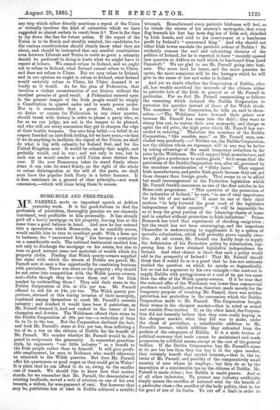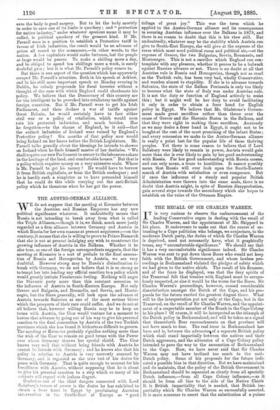HOME-RULE AND FREE-TRADE.
MR. PARNELL made an important speech at Arklow yesterday week. It is his good-fortune to find the profession of patriotism, thoroughly genuine we are sincerely convinced, very profitable to him personally. It has already paid off a heavy mortgage on his property, leaving him at the same time a good balance in hand. And now he has entered into a speculation which Home-rule, as he candidly avows, would enable him to turn to excellent profit. With a keen eye to business, the " uncrowned king " has become a contractor on a considerable scale. The national testimonial enabled him not only to discharge the mortgage on his estate, but also to turn to good account some raw materials of wealth which his property yields. Finding that Welsh quarry-owners supplied the stone with which the streets of Dublin are paved, Mr. Parnell saw at once a fine opportunity for combining business with patriotism. There was stone on his property ; why should he not enter into competition with the Welsh quarry-owners, and—Celts though they be—beat them out of the Irish market by underselling them ? They sold their stone to the Dublin Corporation at 26s. or 27s. per ton. Mr. Parnell offered to sell his at 24s. per ton. The Welsh quarry pro- prietors, alarmed at this daring invasion of their monopoly, combined among themselves to crush Mr. Parnell's nascent industry ; and crushed it would have been if patriotism, as Mr. Parnell deemed it, had not rushed to the rescue of her champion and devotee. The Welshmen offered their stone to the Dublin Corporation at 20s. per ton—a reduction of from 6s. to 7s. in the ton. But the Corporation declined the bait, and took Mr. Parnell's stone at 24s. per ton, thus inflicting a tax of 4s. a ton on the citizens of Dublin for the benefit of Mr. Parnell. We wonder whether Mr. Parnell would be dis- posed to reciprocate the generosity. In somewhat grandiose style, he represents " our little industry " as a benefit to the Irish people rather than to himself. It will give profit- able employment, he says, to Irishmen who would otherwise be attracted to the Welsh quarries. But does Mr. Parnell offer his quarrymen as good wages as they could get in Wales ?
It is plain that he can afford to do so, owing to the smaller cost of transit. We should like to know how that matter stands, for we remember that Mr. Parnell, the denunciator of evicting landlords, served a writ of eviction on one of his own tenants, a widow, for non-payment of rent. But however that may be, patriotism has at least in Dublin achieved a notable triumph. Henceforward every patriotic Irishman will feel, as he treads the streets of his country's metropolis, that every flag beneath his feet has been dug out of Irish soil, chiselled by Irish hands, and sold to his countrymen at a handsome profit by Ireland's " uncrowned king." And why should not other Irish towns emulate the patriotic ardour of Dublin ? So evidently reasons the cool and calculating dictator of the politics of Ireland, for he is reported to have " recently opened new quarries at Arklow on land which he has leased from Lord Cayscroft." We are glad to see Mr. Parnell going into busi- ness. The more land he leases, and the more quarries he opens, the more numerous will be the hostages which he will give to the cause of law and order in Ireland.
And yet we doubt whether the Corporation of Dublin, after all, has weakly sacrificed the interests of the citizens either to patriotic love of the Irish in general or of Mr. Parnell in particular. For we find Mr. Parnell summarising as follows the reasoning which induced the Dublin Corporation to patronise his quarries instead of those of his Welsh rivals. The members of the Corporation, he tells us, said to them- selves :—" The Welshmen have lowered their prices now because Mr. Parnell has come into the field ; they want to stamp him out, to restore their own monopoly, and charge us again the old price, the high price which Mr. Parnell has suc- ceeded in reducing." Therefore the members of the Dublin Corporation, " like sensible men," as Mr. Parnell says, con- cluded very prudently :—" Neither we, the Dublin Corporation, nor the citizens whom we represent, will in any way be better by taking advantage of the small temporary reduction in the price by the Welshmen. We will support Irish manufacture, and we will give a preference to native goods." So it seems that the patriotism of the Dublin Corporation was, after all, governed by the mundane consideration of " filthy lucre." They support Irish manufactures, and prefer Irish goods because they can get them cheaper than foreign goods. That seems to us to afford but small encouragement to the Protective legislation which Mr. Parnell frankly announces as one of the first articles in his Home-rule programme. " This question of the protection of the industries of Ireland," he says, " is one of vital importance for the life of our nation." It must be one of their chief motives " to help forward the great work of the legislative independence of their country." " It will be impossible for us to keep the great portion of the labouring-classes at home and in comfort without protection to Irish industries." Prince Bismarck has tried that experiment of checking emigration ; but the result has not been encouraging, and the imperious Chancellor is endeavouring to supplement it by a system of sporadic colonisation, which will probably prove equally abor- tive. At all events, Mr. Parnell can hardly hope to supply the deficiencies of his Protective policy by colonisation, sup- posing him to have obtained legislative independence for Ireland. And what chance is there that such a policy would add to the prosperity of Ireland ? That Mr. Parnell should think that it would do so is a proof that he has not seriously studied the question on which he speaks so dogmatically. Let us test his argument by his own example—the contract to supply Dublin with paving-stones at a cost of 4s. per ton more than the offer of the Welsh quarry-owners. If it be true that the reduced offer of the Welshmen was lower than commercial prudence would justify, and was, therefore, made merely for the temporary purpose of crushing Mr. Parnell, there was neither patriotism nor protection in the concession which the Dublin Corporation made to Mr. Parnell. The Corporation bought their stones in the cheapest market—that is, acted as sound and sensible Free-traders. If, on the other hand, the Corpora- tion did not honestly believe that they were really buying in the cheapest market, what they did was to make, under the cloak of patriotism, a considerable addition to Mr. Parnell's income, which addition they extracted from the pockets of the ratepayers of Dublin. It is a stale truism of political economy that trade cannot be maintained and made prosperous by artificial means, except at the cost of the general welfare. If the Dublin Corporation buy Mr. Parnell's stone at 4s. per ton less than they can buy it in the open market, they certainly benefit that special interest,—that is, the in- terest of Mr. Parnell, and possibly of the comparatively small number of men whom he employs ; but they do so by the imposition of a considerable tax on the citizens of Dublin. Mr. Parnell is made richer ; but Dublin is made poorer. And so of all other industries. To protect any industry artificially simply means the sacrifice of national weal for the benefit of a particular class—the sacrifice of the body politic, that is, for the gool of one of its limbs. To cut off a limb in order to save the body is good surgery. But to let the body mortify in order to save one of its limbs is quackery ; and " protection for native industry," under whatever specious name it may be called, is political quackery of the grossest kind. If Mr. Parnell were in a position to establish a Protective tariff in favour of Irish industries, the result would be an advance of prices all round to the consumers,—in other words, to the nation. A few capitalists would make fortunes, but the people at large would be poorer. To make a shilling more a day, and be obliged to spend ten shillings more a week, is surely doubtful gain ; but it is what Mr. Parnell's policy comes to.
But there is one aspect of the question which has apparently escaped Mr. Parnell's attention. Both in his speech at Arklow, and in his still more important speech on Monday evening in Dublin, he calmly propounds his fiscal heresies without a thought of the ease with which England could checkmate his policy. We believe that the Democracy of this country are far too intelligent to be provoked into retaliatory tariffs against foreign countries. But if Mr. Parnell were to get his Irish Parliament, and then declare a war of tariffs against Great Britain, he would certainly have to face either civil war or a policy of retaliation, which would soon ruin his protected industries, and much besides. Has he forgotten—to the shame of England, be it said—that the extinct industries of Ireland were ruined by England's Protective policy ? Six months of that policy now would bring Ireland on her knees before the British Legislature. Mr. Parnell talks grandly about the blessings he intends to shower on Ireland when he finds himself master of her destinies. " We shall require our new Parliament to secure to the labourers a share in the heritage of the land, and comfortable houses." But that is a policy which requires money on a very extensive scale. Where is Mr. Parnell to get his money ? He would have to borrow it from British capitalists, er from the British exchequer ; and he is hardly such a simpleton as to have persuaded himself that he could do this while carrying out the anti-British policy which he threatens when he has got the power.



































 Previous page
Previous page